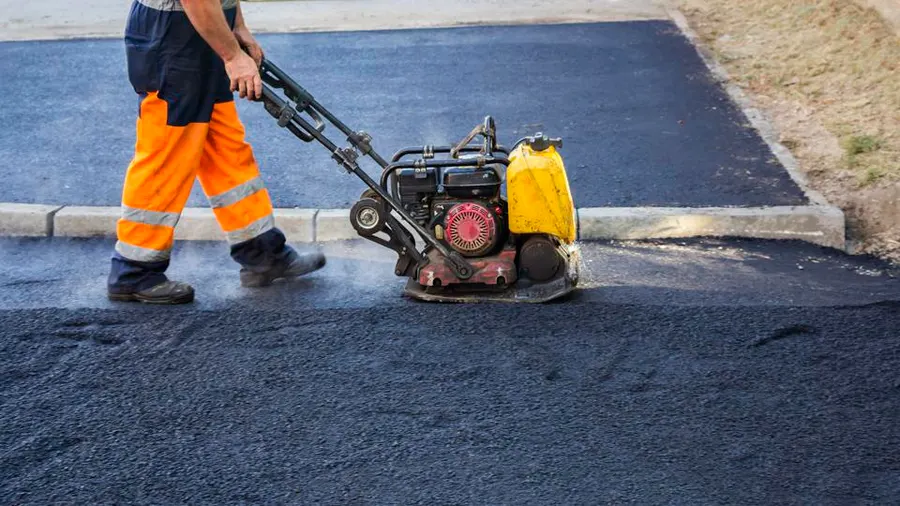1. Finding the Right Asphalt Contractor
When it comes to finding the right asphalt contractor for your project, it’s essential to assess their credentials and experience. Look for contractors who are licensed and insured, as this ensures they have met the necessary requirements to operate in your area. Additionally, check if they have any certifications or memberships in professional associations related to the asphalt industry. These qualifications demonstrate their commitment to maintaining industry standards and staying updated with the latest practices.
Reading client reviews and testimonials is another crucial step in finding the right asphalt contractor. Look for feedback from previous customers to get a sense of the contractor’s professionalism, quality of work, and adherence to deadlines. Positive reviews and satisfied customers are indicators of a reputable contractor who can deliver on their promises.
Another aspect to consider is evaluating the past projects and portfolios of the asphalt contractor. Request examples of their previous work that is similar in scope to your project. By reviewing their portfolio, you can assess the quality of their workmanship and determine if their style aligns with your vision. It’s also an opportunity to ask for references and speak directly with previous clients to gain insights into their experience working with the contractor.
2. Understanding the Scope of the Project
Before hiring an asphalt contractor, it’s crucial to have a clear understanding of the scope of your project. This includes determining the size and complexity of the asphalt work required. Consider factors such as the area to be paved, the type of pavement needed (e.g., driveway, parking lot, road), and any unique design or layout requirements.
Analyzing site conditions and potential challenges is also necessary to ensure the project’s success. Take note of factors such as existing structures, landscape features, and soil conditions that may affect the asphalt work. Identifying these challenges beforehand allows the contractor to plan and mitigate potential issues effectively.
Furthermore, it’s important to identify specific requirements and objectives for your project. Communicate your expectations to the contractor in terms of durability, aesthetics, and functionality. Clearly outlining your objectives ensures that both you and the contractor are on the same page and working towards a common goal.
3. Exploring Asphalt Materials and Techniques
Understanding different types of asphalt pavement mixtures is crucial when hiring an asphalt contractor. Asphalt can be composed of various aggregates and binders, each with its own characteristics and benefits. Common types include hot mix asphalt, warm mix asphalt, and cold mix asphalt. Researching these options and discussing them with your contractor can help determine the most suitable material for your project.
Considerations for climate and weather conditions are also important when selecting asphalt materials. Different regions experience varying temperatures, rainfall patterns, and freeze-thaw cycles, which can impact the performance of asphalt. Discuss these factors with your contractor to ensure the chosen material is suitable for your local climate, providing longevity and minimizing maintenance needs.
Exploring innovative asphalt techniques and technologies is also worth considering. New advancements in the industry, such as porous asphalt or recycled asphalt pavement, offer environmentally friendly and cost-effective solutions. Discuss these options with your contractor to determine if they align with your project goals and budget.
4. Ensuring Quality and Longevity
Ensuring quality and longevity of your asphalt project requires attention to various key factors. One crucial aspect is proper base preparation. The quality of the base layer significantly influences the stability and durability of the asphalt pavement. The contractor should ensure proper grading, compaction, and adequate thickness of the base layer to provide a solid foundation for the asphalt.
Examining sealcoating and maintenance options is also important to extend the lifespan of your asphalt pavement. Sealcoating acts as a protective layer, shielding the asphalt from UV rays, water damage, and other harmful elements. Discuss with your contractor the frequency of sealcoating and available maintenance options to keep your pavement in optimal condition.
Addressing drainage and potential water damage issues is crucial to prevent structural problems and prolong the life of your asphalt pavement. Poor drainage can lead to water pooling, which can weaken the asphalt and eventually cause cracks and potholes. Proper grading and installation of drainage systems are essential considerations for your asphalt project.
In conclusion, hiring professional asphalt contractors requires careful consideration of their credentials, experience, and past projects. Understanding the scope of the project, exploring asphalt materials and techniques, and ensuring quality and longevity are fundamental steps in achieving a successful asphalt project. By following this guide, you can confidently choose a contractor who will deliver excellent results and meet your expectations. Remember, investing in a reputable contractor and quality materials will result in a durable and aesthetically pleasing asphalt pavement that withstands the test of time.
FAQ
Question: How do I find the right asphalt contractor for my project?
Answer: When looking for an asphalt contractor, assess their credentials, experience, and qualifications. Check if they are licensed, insured, and have certifications or memberships in professional associations. Reading client reviews and testimonials can also provide insights into their professionalism and quality of work. Evaluating their past projects and portfolios, as well as speaking with previous clients, can help gauge their workmanship and reliability.
Question: What factors should I consider when determining the scope of my asphalt project?
Answer: To determine the scope of your project, consider the size and complexity of the asphalt work required. Assess factors such as the area to be paved, the type of pavement needed, and any unique design or layout requirements. Analyze site conditions, including existing structures, landscape features, and soil conditions that may impact the project. Clearly communicate your requirements and objectives to ensure everyone is on the same page.
Question: How can I choose the most suitable asphalt material for my project?
Answer: Understanding different types of asphalt materials is crucial. Research options such as hot mix asphalt, warm mix asphalt, and cold mix asphalt, each with its own characteristics and benefits. Consider factors like climate and weather conditions, as they affect the performance of the asphalt. Consult with your contractor to select a material that suits your local climate, provides longevity, and aligns with your project goals and budget.
Question: What are some important factors to ensure the quality and longevity of my asphalt project?
Answer: Proper base preparation is essential for a durable asphalt pavement. The contractor should ensure proper grading, compaction, and adequate thickness of the base layer, providing a solid foundation. Addressing drainage and potential water damage issues is crucial to prevent structural problems. Discussing sealcoating and maintenance options with your contractor can help extend the lifespan of the asphalt pavement.
Question: When should I sealcoat my asphalt pavement?
Answer: Sealcoating acts as a protective layer for asphalt, shielding it from UV rays, water damage, and other harmful elements. The frequency of sealcoating may vary based on factors such as climate and usage. Consult with your contractor to determine the appropriate timing and maintenance options to keep your pavement in optimal condition.
Question: What innovative asphalt techniques and technologies should I consider?
Answer: Explore new advancements in the industry, such as porous asphalt or recycled asphalt pavement. These options offer environmentally friendly and cost-effective solutions. Discuss these techniques with your contractor to see if they align with your project goals and budget.
Question: How can I ensure my asphalt project meets industry standards?
Answer: By hiring a licensed and certified asphalt contractor who is a member of professional associations, you can ensure they are committed to maintaining industry standards and following the latest practices. Checking their credentials and reviewing client feedback can give you confidence in their professionalism and quality of work.
Question: What are some typical considerations for evaluating an asphalt contractor’s past projects?
Answer: When evaluating an asphalt contractor’s past projects, consider request examples of their previous work that is similar in scope to your project. Review their portfolio to assess the quality of their workmanship and style. Additionally, ask for references and speak with previous clients to gain insights into their experience working with the contractor.

